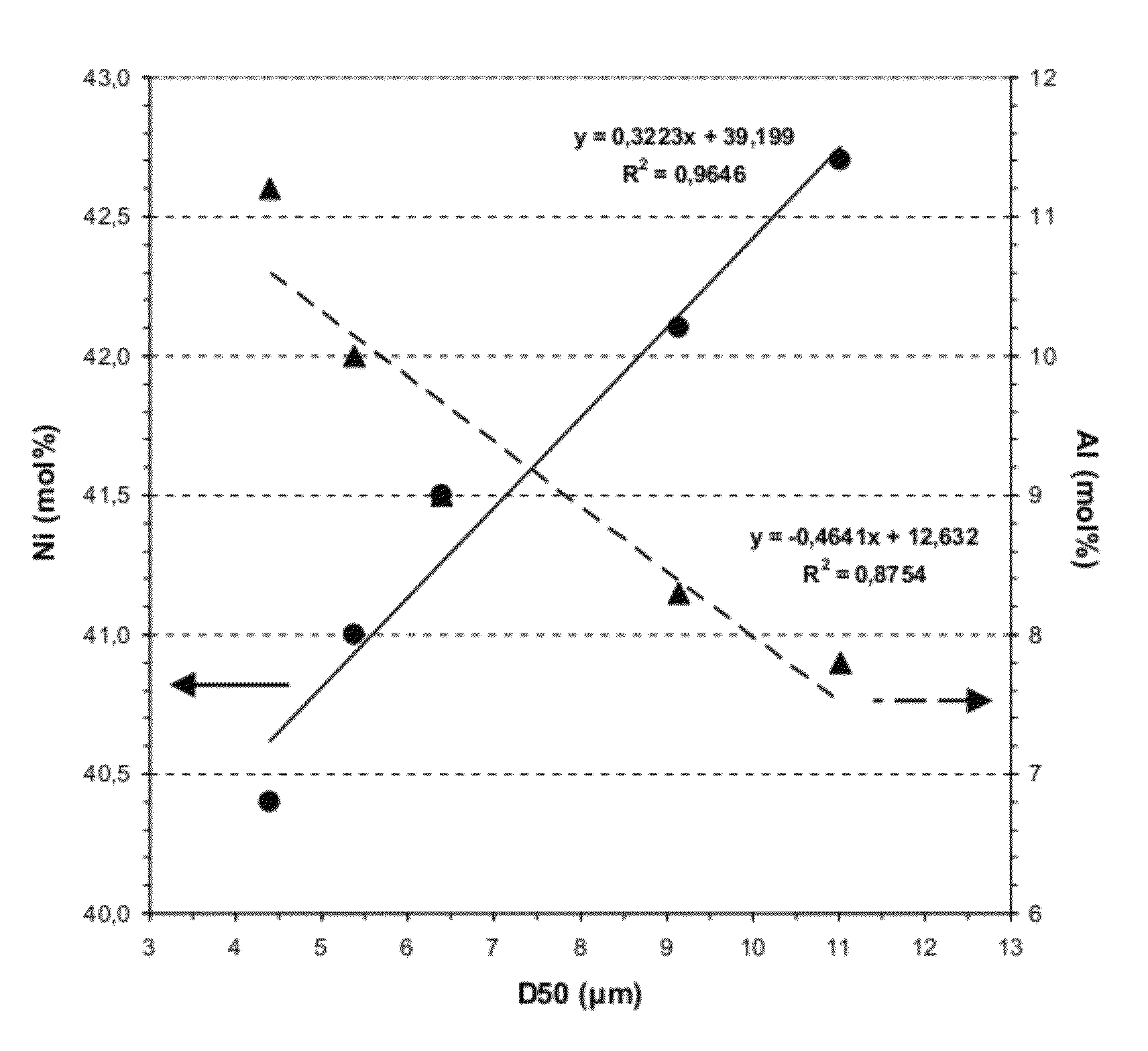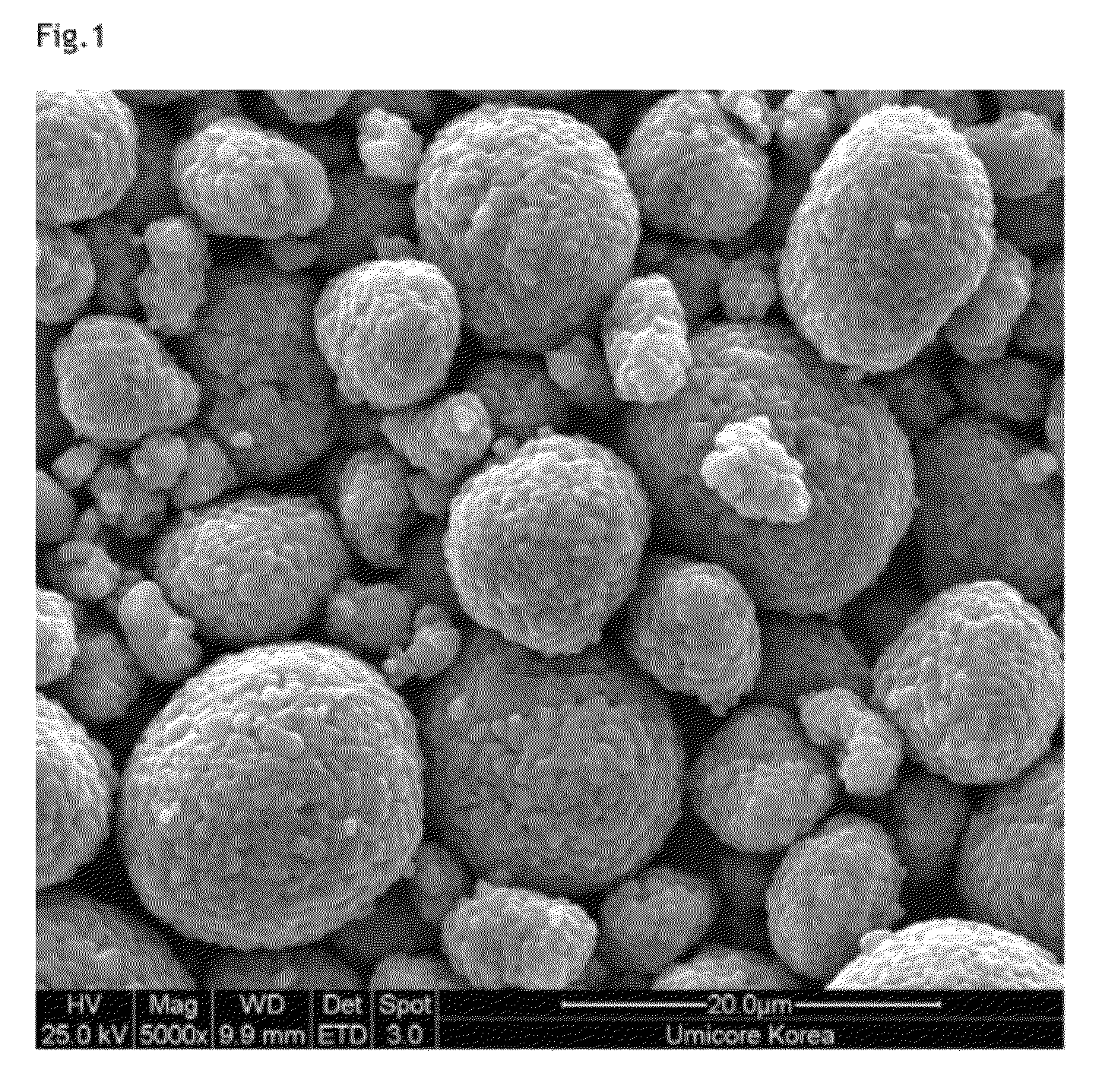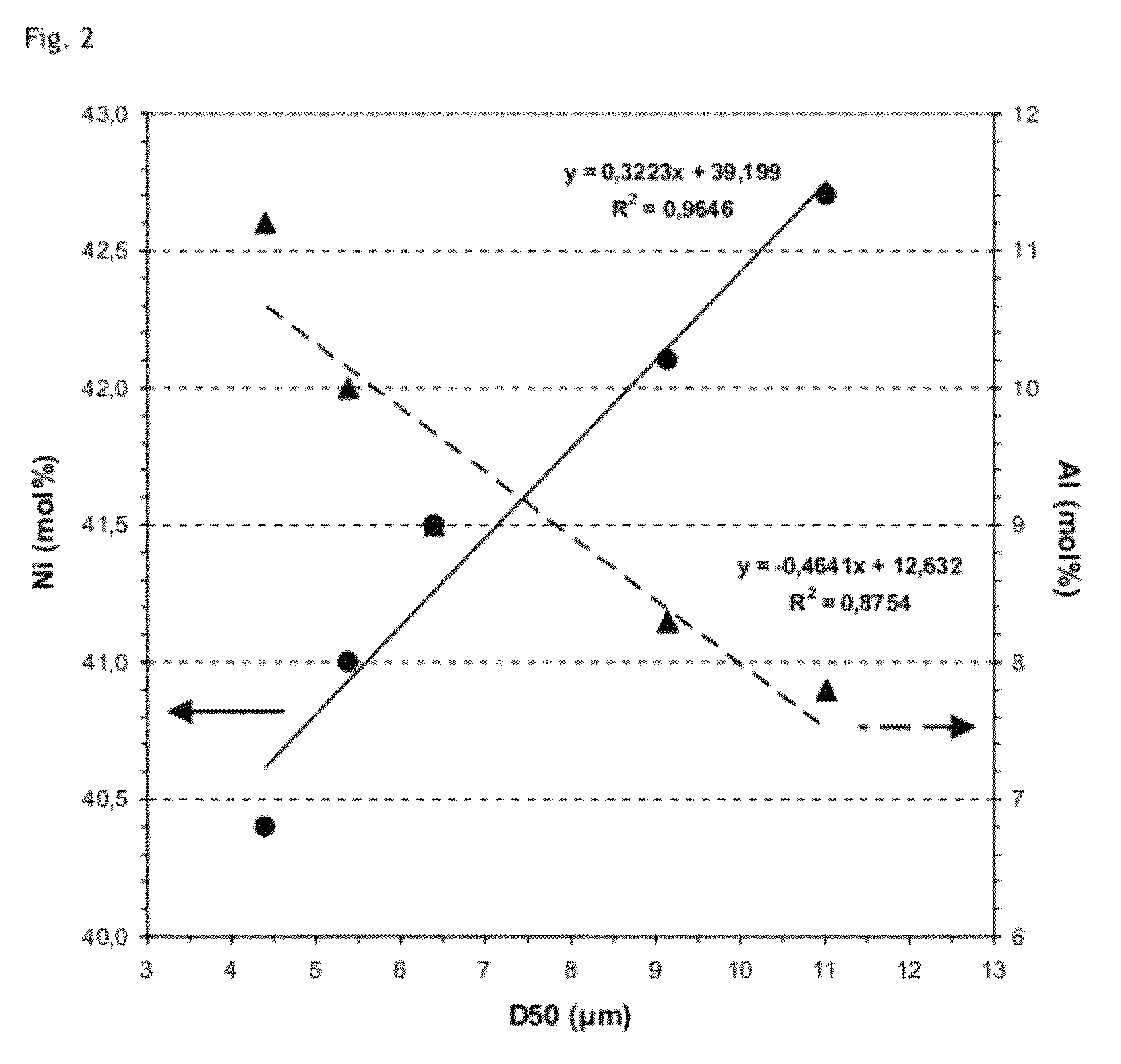Positive electrode materials combining high safety and high power in a Li rechargeable battery
a positive electrode and rechargeable battery technology, applied in the direction of non-aqueous electrolyte accumulator electrodes, electrical equipment, electrochemical generators, etc., can solve the problems of high cost of licoosub>2/sub>-based cathode materials, and limiting the maximum possible particle size of a given composition. , to achieve the effect of increasing the particle size and increasing the particle siz
- Summary
- Abstract
- Description
- Claims
- Application Information
AI Technical Summary
Benefits of technology
Problems solved by technology
Method used
Image
Examples
example 1
[0041]In a first step, a composite Ni—Mn—Co—Al (or NMCA) hydroxide precursor with molar composition 39.9:35.2:12.8:12.2 is precipitated from Ni, Mn, Co and Al sulphates in the presence of NaOH and ammonia. The obtained NMCA hydroxide has a spherical shape and the average particle size as measured from laser granulometry is centered around D50=5.4 μm (D10=3.4 μm, D90=8.9 μm).
[0042]In a second step, a NMCA hydroxide precursor with molar composition 42.3:35.7:13.7:8.3 is precipitated from Ni, Mn, Co and Al sulphates in the presence of NaOH and ammonia. The obtained NMCA hydroxide shows spherical shape and the average particle size as measured from laser granulometry is centered around D50=9.3 μm (D10=5.0 μm, D90=16.5 μm).
[0043]In a third step a NMCA hydroxide precursor with molar composition 44.3:35.8:13.8:6.0 is precipitated from Ni, Mn, Co and Al sulphates in the presence of NaOH and ammonia. The obtained NMCA hydroxide shows spherical shape and the average particle size as measured ...
example 2
Counter Example
[0064]In a first step, an NMCA hydroxide material with molar composition 41.8:35.7:14.1:8.4 is precipitated from Ni, Mn, Co and Al sulphates in the presence of NaOH and Ammonia. The average particle size as measured from laser granulometry is centered around D50=8.5 μm (D10=2.0 μm, D90=18.0 μm).
[0065]In a second step, the hydroxide is mixed with Li2CO3 such that Li / (Ni+Mn+Co+Al)=1.075. The mixture is then heated in a chamber furnace under ambient air at 980° C. for 10 h. The composition of the obtained LiaNixCoyAlzO2 powder as deduced from ICP is Ni:Mn:Co:Al 42.1:34.5:14.2:9.2.
[0066]The particle size distribution from the product after firing is measured by laser diffraction granulometry and gives a PSD with D10=2.4 μm, D50=7.8 μm, D90=20.1 μm. The EDS analysis performed on the product of the counter example shows that the composition does not vary substantially with the particle size (see FIG. 5& Table 2). It has to be noted that molar concentrations measured using E...
example 3
[0075]5 LiNi0.47Mn0.38Co0.15AlxO2 compounds were prepared with different molar compositions of Al (x=0%, 1.5%, 3%, 5% and 10%) and measured using DSC (differential Scanning calorimetry) to illustrate the positive influence of Al-content on the safety performance. Small electrodes, containing about 3.3 mg of active material are punched and assembled in coin cells. Coin cells are charged to 4.3V using a C / 10 charge rate followed by a constant voltage soak for at least 1 h. After disassembly of the coin cells electrodes are repeatedly washed in DMC to remove remaining electrolyte. After evaporating the DMC the electrodes are immersed into stainless steel cans and about 1.2 mg of PVDF based electrolyte is added, following by hermetic closing (crimping) of the cells. The DSC measurement is performed using a TA instrument DSC Q10 device. The DSC scan is performed from 50-350° C. using a heat rate of 5K / min. DSC cells and crimping equipment were also supplied by TA
[0076]The total energy re...
PUM
| Property | Measurement | Unit |
|---|---|---|
| temperature | aaaaa | aaaaa |
| temperatures | aaaaa | aaaaa |
| crystallite size | aaaaa | aaaaa |
Abstract
Description
Claims
Application Information
 Login to View More
Login to View More - R&D
- Intellectual Property
- Life Sciences
- Materials
- Tech Scout
- Unparalleled Data Quality
- Higher Quality Content
- 60% Fewer Hallucinations
Browse by: Latest US Patents, China's latest patents, Technical Efficacy Thesaurus, Application Domain, Technology Topic, Popular Technical Reports.
© 2025 PatSnap. All rights reserved.Legal|Privacy policy|Modern Slavery Act Transparency Statement|Sitemap|About US| Contact US: help@patsnap.com



